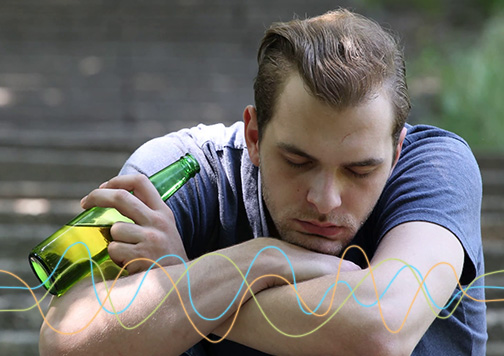Alcohol Abuse

Can Neurofeedback Help with Alcoholism?
Neurofeedback can be a powerful method which helps treat alcoholism. In the classic history of Neurofeedback, A Symphony in the Brain: the Evolution of the New Brain Wave Biofeedback, the author Jim Robbins says: “Research shows that alcoholics cannot produce the appropriate type of Alpha waves., the frequency that is characteristic of feeling relaxed and comfortable, sometimes referred to as an ‘internal anesthetic.’ Without the right kind of Alpha, a person feels raw and exposed and edgy. Alcohol is a chemical that temporarily creates an artificial flow of good Alpha – though it comes, obviously, with the raft of other problems. People who have gone through Alpha–Theta training say they feel more relaxed and may no longer have the overpowering urge to drink.” One of the first studies about the positive effects of Neurofeedback on alcoholism showed that after 15 sessions the results included:
- Increased alpha and theta brainwave production
- Normalized personality measures
- Significant elevation in serum beta-endorphin levels
- Prolonged prevention of relapse
What is Alcoholism?
Alcoholism is a chronic and often progressive disease. The major problem is the lack of control over drinking. Alcoholics Anonymous in the UK describes alcoholism as a physical compulsion, together with a mental obsession. Apart from having an enormous craving for alcohol, the alcoholic knows neither when nor how to stop drinking. Alcoholism has different facets. The alcoholic may be a teenager, a homeless person, or an elegant, high functioning business woman. It is very important to accept the problem and start the treatment because alcoholism may lead to death. Symptoms of Alcoholism can include:
- Impaired control over drinking
- A strong desire to drink alcohol
- A need to drink every day
- Frequent drinking alone
- A need for a drink to stop trembling
- To drink early before noon to avoid withdrawal symptoms
- Spending free time in activities where alcohol is available
- The assumption that alcohol can relax and reduce the tension and anxiety
- The need to look for a possibility to drink in places where it is prohibited (e.g. work)
- Forgetting what you did while you were drinking
- Hiding alcohol and drink in secret
- Lying about alcohol
- Drinking after a long period of abstinence
- Continuing to drink even though alcohol use is causing problems in relationships
- Wanting to quit drinking without being able to.
According to statistics on alcohol:
- More than 9 million people in England drink more than the recommended daily limits
- In England, in 2012 there were 6,490 alcohol-related deaths, a 19% increase compared to 2001
- Alcohol is 10% of the UK burden of disease and death, making alcohol one of the three biggest lifestyle risk factors for disease and death in the UK, after smoking and obesity
- In 2012 there were 8,367 alcohol-related deaths in the UK
- In England and Wales, 63% of all alcohol-related deaths in 2012 were caused by alcoholic liver disease
- Liver disease is the only major cause of mortality and morbidity which is on the increase in England,whilst decreasing in other European Countries.
Symptoms of Alcoholism
Treatment for alcoholism starts when the alcoholic accepts the problem and wants to stop drinking. The goal of the treatment is based on abstinence. Social support, good health, and strong motivation are the best predictors that the alcoholic will stay sober permanently. Unfortunately, poor motivation, lack of support and mental disorders can cause the return to drinking. Treatment has 3 stages: 1. Detoxification (which might require medication to detoxify safely) 2. Rehabilitation (counseling and/or medication) 3. Maintenance of sobriety (e.g. support of sponsor from AA meetings, psychotherapy).
Associated symptoms of Anger
- Slurred or incoherent speech
- Poor balance and clumsiness
- Delayed reflexes
- Stomach pains, vomiting or nausea
- Loss of consciousness or blacking-out
- Redness of the face during or after periods of consumption
Neurofeedback and Alcoholism
Alcoholism is a brain disease. Alcohol impairs the brain dramatically. Compare the brain of a 43-year-old normal person with 43-year-old alcoholic’s brain: The brain of the alcohol dependent person is smaller BUT a long period of abstinence or moderate drinking can restore the volume of heavy drinker’s brains. Additionally, cognitive functioning tends to return to normal when brain size returns to normal. Scientists claim that alcoholics cannot produce the Alpha waves which are necessary for relaxation. During Neurofeedback sessions, clients can learn to increase Theta and Alpha waves. Several studies suggest that Alpha-Theta Brainwave Neurofeedback training has the potential for decreasing alcohol craving and relapse prevention. Some alcoholics who undergo Alpha-Theta training and try to use alcohol again, get physically sick when they do. This attests to the powerful effects that are possible with Alpha-Theta Neurofeedback. Whilst Neurofeedback can be a powerful tool to help you to change your relationship with alcohol, it is strongly recommended that you undertake it in conjunction with other support, such as psychotherapy and/or attending AA meetings. You should also consider consulting with your doctor before you stop heavy drinking suddenly.
